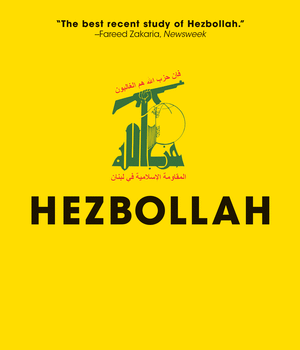Here we go again: yet another American “scholar” who apologizes for an Islamist terrorist group that exists first and foremost to murder, maim and destroy. With Hezbollah: A Short History, Augustus Richard Norton, a Boston University professor of international relations and anthropology, has joined the ranks of dozens of US academics who inexplicably teach the kinder and gentler side of terrorists.
Norton, a former observer with the United Nations Truce Supervision Organization, states in his prologue that he seeks to provide “a more balanced and nuanced account” of Hizbullah, which he calls a “complex organization.” Of course, there is little that is complex or nuanced about a group that receives an estimated $100 million a year from the radical Islamic regime in Iran to carry out violence, and has used violence as its raison d’etre dating back to the 1980s.
Indeed, Hizbullah exists to further the violent aims of Iran, to demonize and attack the US and to destroy Israel. Norton neglects to state this unequivocally and, for that reason, he should be publicly shamed.
To know Hizbullah’s violent history is to know Hizbullah. The group was implicated in the 1983 bombings of the US Marine barracks (241 dead) and French paratrooper barracks (141 dead) in Beirut, as well as a string of kidnappings and bombings against Western targets in Lebanon and beyond in the 1980s. Hizbullah was also responsible for the 1992 bombing of the Israeli Embassy (29 dead) and the 1994 bombing of a Jewish community center (95 dead) in Argentina. It later became known for hit and run attacks against IDF targets (killing or wounding dozens) in southern Lebanon. After Israel withdrew to the UN-recognized border in 2000, Hizbullah continued to attack Israel in the Shaba Farms region, even though the UN verified Israel’s withdrawal as complete and legal, according to international law. Last summer, Hizbullah launched thousands of missiles indiscriminately into Israel, killing and wounding mostly civilians and causing billions of dollars in damage. The group launched its weapons from within heavily populated civilian areas in Lebanon, putting the local population in danger of reprisals.
Norton’s book tries to explain away this violence. He writes that the term “terrorist” is a “rhetorical bludgeon” used to “dehumanize radical or revolutionary groups.” Interestingly, he admits that Hizbullah was “deeply implicated” in the June 1985 hijacking of a TWA flight. He concedes that Hizbullah killed an American serviceman in that attack, which he admits was a “terrorist” operation. However, Norton attempts to explain that Hizbullah was attempting to free prisoners in Israeli jails who had “participated in resistance operations,” while other prisoners “were merely suspects that Israel held hostage.”
In ascribing logic to Hizbullah’s terrorist violence, Norton exposes himself as an apologist. By using the word “resistance” instead of “terrorism,” he indicates that he has adopted Hizbullah’s parlance. By alleging that Israel was holding innocents in jail on a whim, he indicates that he is now complicit in spreading Hizbullah propaganda.
Norton cites one of Hizbullah’s founding documents, which states that every Hizbullah fighter “is a combat soldier when the call of jihad demands it.” He acknowledges that the “ultimate objective [for Hizbullah] is to destroy Israel,” but when he discusses Hizbullah violence against Israel, that violence is described as “resistance.” He writes admiringly of Hizbullah’s “careful planning and well-practiced professionalism,” and has the audacity to state that Hizbullah “usually” did not “intentionally target Israeli civilians.” This seems to imply that the occasional Katyusha barrage on Israel’s northern towns was acceptable. Moreover, he lauds Hizbullah restraint for killing only nine Israeli soldiers during the “six years of relative stability” from 2000 to 2006.
Norton also attempts to explain that whatever ordnance lands in Israeli civilian areas is the result of Hizbullah “firing anti-aircraft weapons at Israeli planes violating Lebanese airspace, but as they were firing southward, in the direction the planes were coming from, the spent ammunition rounds would land in Israel.” Indeed, Norton seems to have a logical explanation for naked Hizbullah aggression.
Disturbing, also, is Norton’s description of Hizbullah’s reasons for violence against Israel after the 2000 withdrawal to UN-approved borders. He praises Hizbullah’s “clever pretext” to continue “paramilitary operations against Israel,” by attacking IDF patrols in the Shaba Farms region. Thus, while the UN condemns Hizbullah for its continued violation of international law, this Boston University professor finds it “clever.” If one had any question as to how Norton views Hizbullah violence, page 86 sums it up. He claims that all 12 of Hizbullah’s suicide attacks against the US, France and Israel were “legitimate resistance targets.”
Tellingly, only 24 of the 159 pages of written text in this book deal with the question of Hizbullah’s violence. That constitutes about 15 percent. The rest talks about the group’s founding, political activities, social infrastructure and even its participation in Shi’ite Ashura ceremonies (mourning the death of Hussein, the prophet Muhammad’s grandson, at the Battle of Karbala in 680 CE).
Upon reading this book, one cannot help but be struck by the similarities between Norton and British author Patrick Seale, the “court biographer” of the Assad regime in Syria. In exchange for the unfettered access he has received over the years, Seale has produced numerous books and articles that heap praise on the autocratic and terrorist-sponsoring state of Syria. Norton, who explains in his acknowledgments that he was given “an unusually privileged, if fortuitous, entrée to local Shi’ite politics,” appears to have had similar exposure to Hizbullah leaders and mouthpieces.
Seale, however, is not an academic. Norton is. As such, he has failed the academic community by trading access for objectivity, honesty and integrity. Knowing where Norton stands on Hizbullah, one can only wonder what he teaches his students.
The writer, a former US Treasury intelligence analyst, is director of policy for the Jewish Policy Center. He is author of Al-Qaeda’s Armies: Middle East Affiliate Groups and the Next Generation of Terror.


